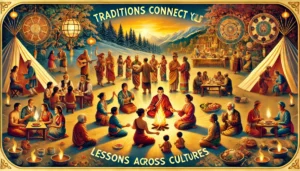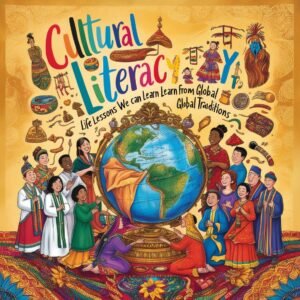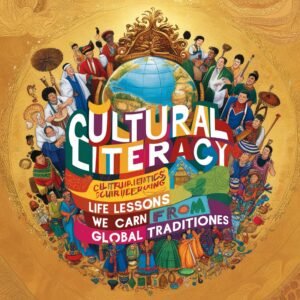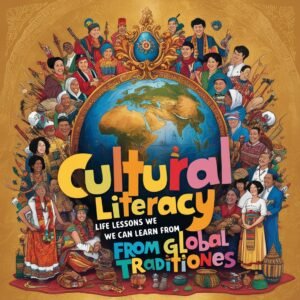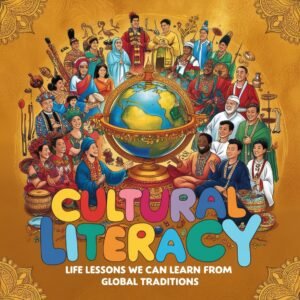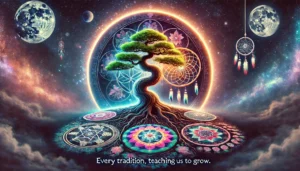Cultural Literacy: Life Lessons We Can Learn from Global Traditions
Cultural Literacy: Life Lessons We Can Learn from Global Traditions
In today’s interconnected world, understanding and appreciating diverse cultures is more than just a nice-to-have skill—it’s essential. Cultural literacy isn’t just about knowing the geography of a country or recognizing its famous monuments. It’s about understanding the values, beliefs, and traditions that shape how people live, work, and relate to one another. By exploring global traditions, we uncover life lessons that can enrich our lives and help us navigate a multicultural world with greater empathy and understanding.
Why Does Cultural Literacy Matter?
Cultural literacy helps us bridge gaps, build connections, and appreciate the beauty of diversity. It reduces prejudice, fosters mutual respect, and empowers us to communicate effectively in today’s globalized society. Whether it’s about creating harmonious workplaces or building stronger personal relationships, cultural literacy teaches us to embrace differences and find common ground.
Life Lessons We Can Learn from Global Traditions
Here are some beautiful traditions from around the world and the timeless wisdom they offer us:
1. Ubuntu (South Africa): The Power of Community
The Zulu philosophy of Ubuntu means “I am because we are.” It emphasizes the interconnectedness of people and the value of caring for one another.
- What it Teaches Us: Relationships matter. By prioritizing empathy, cooperation, and mutual support, we can create stronger communities and networks.
2. Bowing in Japan: Gratitude and Humility
In Japan, bowing is more than a polite greeting—it’s a way to express respect, gratitude, and humility. It’s a cultural cornerstone that reminds us to acknowledge others with sincerity.
- What it Teaches Us: Small gestures of respect can have a big impact. Practicing gratitude and humility strengthens relationships and fosters trust.
3. Lagom (Sweden): Simplicity and Balance
Lagom is a Swedish concept that means “just the right amount.” It’s about finding balance in all aspects of life, whether it’s work, leisure, or relationships.
- What it Teaches Us: Moderation is key to happiness. Striving for balance helps us reduce stress and live more fulfilling lives.
4. Día de los Muertos (Mexico): Resilience in Adversity
The Mexican tradition of Día de los Muertos (Day of the Dead) turns mourning into celebration. Families honor their loved ones with vibrant altars, food, and festivities.
- What it Teaches Us: Life is fleeting, and that’s okay. Celebrating the memories of those we’ve lost helps us find strength in difficult times.
5. Indigenous Wisdom: Respect for Nature
From the Maori of New Zealand to Native American tribes, Indigenous cultures worldwide teach us the importance of living in harmony with nature. Many rituals honor the environment and emphasize sustainability.
- What it Teaches Us: Our planet is our responsibility. By adopting eco-friendly practices, we can protect our environment for future generations.
6. Arab Culture: Hospitality and Generosity
In Arab traditions, hospitality is a deeply ingrained value. Guests are welcomed with warmth and generosity, often being treated as family.
- What it Teaches Us: Kindness and generosity go a long way. Welcoming others with an open heart fosters goodwill and stronger connections.
7. Buddhist Meditation Practices: Mindfulness and Inner Peace
In Buddhist traditions, especially in Thailand and Tibet, mindfulness is a way of life. Meditation practices help people find inner peace and self-awareness.
- What it Teaches Us: Mindfulness helps us stay grounded. By observing our thoughts and emotions without judgment, we can reduce stress and improve our focus.
8. Hindu Festivals: Resilience and Renewal
Festivals like Diwali and Holi celebrate the triumph of good over evil and the importance of renewal. These joyous occasions teach us that every ending can be a new beginning.
- What it Teaches Us: Challenges are opportunities in disguise. Facing adversity with optimism helps us grow and move forward.
9. Italian Family Dinners: The Joy of Togetherness
In Italy, family meals are about more than just food. They symbolize love, connection, and the importance of nurturing bonds through shared experiences.
- What it Teaches Us: Quality time matters. Sharing meals and conversations with loved ones strengthens relationships and creates lasting memories.
10. Confucian Teachings (China): Lifelong Learning
Confucian philosophy emphasizes the importance of education and continuous self-improvement as keys to personal and societal harmony.
- What it Teaches Us: Learning never stops. Staying curious and open to new knowledge helps us grow and adapt to a changing world.
How to Build Cultural Literacy in Your Life
Here are some practical ways to cultivate cultural literacy:
- Travel and Explore: Visit new places, engage with local communities, and immerse yourself in their traditions.
- Read and Watch: Dive into books, documentaries, and films that offer authentic insights into different cultures.
- Learn a New Language: Language is a gateway to understanding a culture’s heart and soul.
- Attend Cultural Events: Participate in festivals, exhibitions, or workshops that celebrate diversity.
- Engage in Conversations: Talk to people from different backgrounds. Listening to their stories can broaden your perspective.
Final Thoughts
Cultural literacy is more than just knowledge—it’s about seeing the world through others’ eyes and embracing the beauty of diversity. By learning from global traditions, we can cultivate empathy, resilience, and a deeper sense of connection with the world around us. Start your journey of cultural discovery today and see how these timeless lessons can transform your life.
